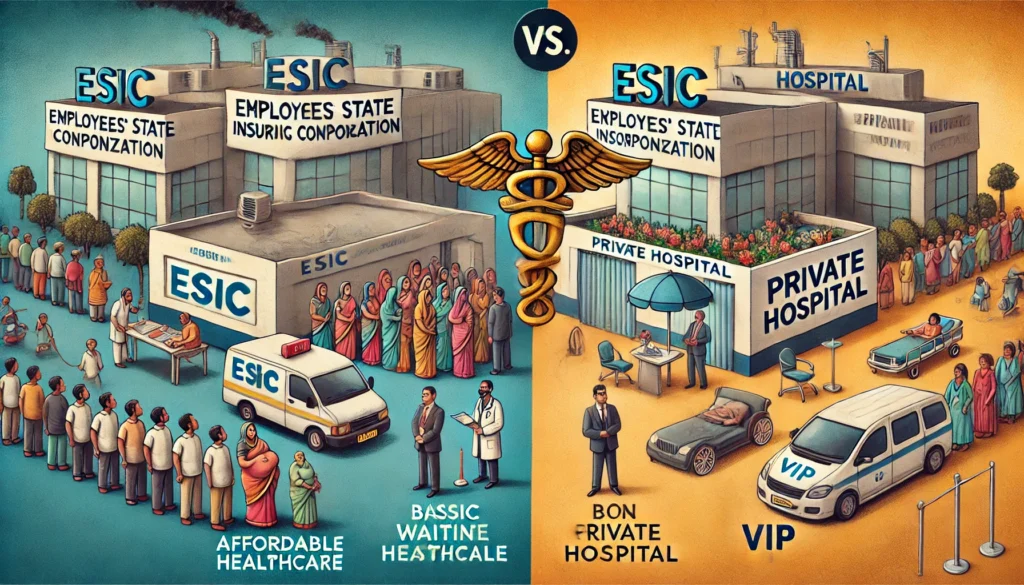ESIC Helps Middle-Class People’s Secure their Financial and Health Stability

Before Knowing about How ESIC Helps Poor and Middle Class Families? Lets Know Origin and Purpose
What is ESIC? A Closer Look at Its Origin and Purpose
The Employees State Insurance Corporation (ESIC) was established in 1952 under the Employees’ State Insurance Act, 1948, with the aim of providing affordable healthcare and financial security to India’s workforce. It started with a modest number of employees and a few medical facilities. Over the decades, ESIC has become a robust social welfare system, extending its services to millions of employees and their families.
How ESIC Addresses Modern-Day Challenges
The middle-class segment, which often falls through the cracks of premium healthcare systems, finds solace in ESIC. It balances accessibility and affordability, ensuring that no family is pushed into poverty due to medical expenses.
In-Depth Overview of ESIC Benefits
The ESIC program provides a wide range of benefits designed to safeguard employees and their families. Let’s explore each benefit in detail:
1. Medical Benefits
Employees and their dependents can access cashless medical treatment at ESIC hospitals. This includes consultations, surgeries, diagnostic tests, and post-treatment care.
- Coverage: From general ailments to specialized treatments like heart surgeries.
- Eligibility: As soon as the employee contributes for a day.
- Read More About:-Health Problems in Children Up to 5 Years Due to Financial Challenges in Poor Families
2. Sickness Benefits
During prolonged illness, employees receive 70% of their wages for up to 91 days per year.
- Example: If an employee earning ₹15,000/month is bedridden for two months, they receive approximately ₹10,500/month during this period.
3. Maternity Benefits
Women employees are entitled to 26 weeks of paid maternity leave. This ensures financial stability during pregnancy and postpartum recovery.
4. Disability Benefits
- Temporary Disability: Employees receive monthly compensation equal to 90% of their wages.
- Permanent Disability: A lifetime pension based on the extent of disability.
5. Dependents’ Benefits
In case of an employee’s death due to occupational hazards, ESIC provides financial support to the dependents.
- Read More About:-
6. Funeral Expenses
A lump sum of ₹15,000 is given to the family for funeral expenses.
Historical Significance of ESIC for India’s Workforce

In the early 1950s, post-independence India struggled with a lack of social security systems. Industrial workers often faced injuries and illnesses with no access to affordable healthcare. ESIC revolutionized this by introducing a state-run insurance model, becoming the first social insurance system in Asia.
Key Milestones of ESIC
- 1952: ESIC was launched in Kanpur and Delhi with two dispensaries.
- 1975: Maternity and funeral benefits were added.
- 2010: ESIC started covering workers earning up to ₹15,000/month (later raised to ₹21,000).
- 2020: Telemedicine services were launched to support workers during the pandemic.
ESIC’s Role During the COVID-19 Pandemic
The COVID-19 pandemic tested healthcare systems worldwide. ESIC rose to the occasion by:
- Setting up isolation wards in ESIC hospitals.
- Waiving medical contribution requirements for several months.
- Extending telemedicine services, ensuring employees and dependents could consult doctors remotely.
How to Register and Avail of ESIC Benefits
1. Employee Registration
- Visit www.esic.in.
- Employers register employees by providing their details and generate the ESIC IP Number.
- Employees receive the e-Pehchan Card, which acts as an identification document.
2. Accessing Benefits
- Medical Care: Present the e-Pehchan card at any ESIC dispensary or hospital.
- Online Services: Employees can track claims, download cards, and check IP numbers via the ESIC portal.
3. Making ESIC Payments
Employers contribute via the ESIC payment gateway. To ensure timely contributions:
- Generate challans on www.esic.in.
- Use the ESIC online payment portal for hassle-free transactions.
State-Wise Implementation of ESIC
The applicability of ESIC varies across states, based on the density of employees and industrial establishments. Here’s a comparison:
| State | Coverage | Notable Hospitals |
|---|---|---|
| Maharashtra | 10 Million Workers | ESIC Model Hospital, Andheri |
| Tamil Nadu | 6 Million Workers | ESIC Medical College, Chennai |
| Uttar Pradesh | 8 Million Workers | ESIC Model Hospital, Lucknow |
| Karnataka | 5 Million Workers | ESIC Super Specialty Hospital, Bengaluru |
Comparison: ESIC vs Private Health Insurance

| Feature | ESIC | Private Health Insurance |
|---|---|---|
| Cost | Low (3.25% + 0.75%) | High premiums |
| Coverage | Employee + Family | Individual or limited family |
| Cashless Facilities | Yes (at ESIC hospitals) | Limited network hospitals |
| Income Replacement | Yes (70% during sickness) | No |
Common Issues and Their Solutions
1. Delays in Claim Approval
- Problem: Employees face delays in receiving sickness or maternity benefits.
- Solution: Ensure that claims are filed with complete documents. Use the ESIC portal to track the status.
2. Difficulty in Accessing IP Numbers
- Problem: Employees lose or forget their IP numbers.
- Solution: Use the “Search by Mobile Number” option on the ESIC portal to retrieve the number.
3. Limited Awareness
- Problem: Many employees are unaware of ESIC benefits.
- Solution: Employers should conduct workshops to educate workers about ESIC services.
Case Studies: How ESIC Has Made a Difference
Story 1: Pooja’s Maternity Support
Pooja, a factory worker in Mumbai, received ₹18,000/month during her maternity leave, allowing her to focus on her newborn without financial stress.
Story 2: Ravi’s Road to Recovery
Ravi, a welder, suffered a workplace injury. ESIC covered his treatment expenses and provided him with 90% of his salary during his recovery period.
Global Perspective: Similar Programs in Other Countries
| Country | Program | Similarities to ESIC |
|---|---|---|
| Germany | Statutory Health Insurance (SHI) | Employer-employee contribution model |
| UK | National Health Service (NHS) | Free medical care for citizens |
| USA | Social Security Disability | Income replacement during disability |
How to Maximize ESIC Benefits for Middle-Class Families
- Update Details Regularly: Ensure employee and dependent information is accurate.
- Attend Awareness Programs: Employers should organize sessions to help employees understand ESIC benefits.
- Use Online Services: Utilize the ESIC portal for quick access to information and claims.
FAQs About ESIC
What is the ESIC portal?
The ESIC portal is an online platform for employees and employers to access ESIC services like registration, payments, and claims.
What is the ESIC e-Pehchan card?
It is a digital card that serves as proof of enrollment and allows access to ESIC benefits.
What happens if an employee’s salary exceeds ₹21,000?
Employees are no longer eligible for ESIC benefits once their salary exceeds ₹21,000.
Conclusion: Why ESIC is a Lifeline for Middle-Class Families
The Employees State Insurance Corporation (ESIC) has been instrumental in offering a safety net for India’s middle-class families. By combining healthcare and income protection, ESIC ensures that employees and their dependents lead a secure life without the fear of financial instability.
For more insightful articles on financial and social security systems, visit ourfinocracy.com today!
